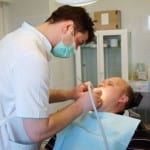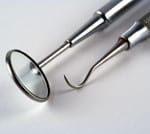 Periodontal disease can cause a number of problems to oral health, often leading to the need for treatment like dental implants if not properly taken care of. It leads to bad breath and a growing number of studies have found that it can also cause a loosened hold on teeth from the gums and the eventual loss of teeth.
Periodontal disease can cause a number of problems to oral health, often leading to the need for treatment like dental implants if not properly taken care of. It leads to bad breath and a growing number of studies have found that it can also cause a loosened hold on teeth from the gums and the eventual loss of teeth.
The disease is usually brought on by poor dental health and is becoming an increasingly common risk to oral health worldwide. It can be hindered from both the dental studio and at home and many dentists are urging patients at risk of the disease or who already suffer from it to use additional oral cleaning equipment such as rinses, floss and tongue scrapers.
A study at Kyushu Dental College in Japan attempted to answer the question: “Does periodontitis cause halitosis or does it occur alongside oral odour?” Halitosis is another word for bad breath and can be caused by a number of things, including dry mouth or particular foods and potentially periodontitis.
The study was conducted by observing the oral health of those with periodontal disease and those without. 101 adults volunteered for the experiment and their oral health was inspected. The volunteers included those with good oral health and those with periodontal disease. Saliva samples were taken from each patient in an attempt to discover exactly how periodontitis and bad breath are related.
The study eventually discovered that the presence of the bacteria – bacteroides forsythus – in the main area of the mouth shows positive links to bad breath. The bacteria is usually only found underneath the gums of people suffering from advanced periodontal decay.
The discovery of the exact bacteria present in the mouth of a person suffering from periodontal disease should go a long way towards curing halitosis in those with the disease, with eventual hopes that a prevention of the disease can be found. If this is not the case treatment such as dental implants may be recommended.












